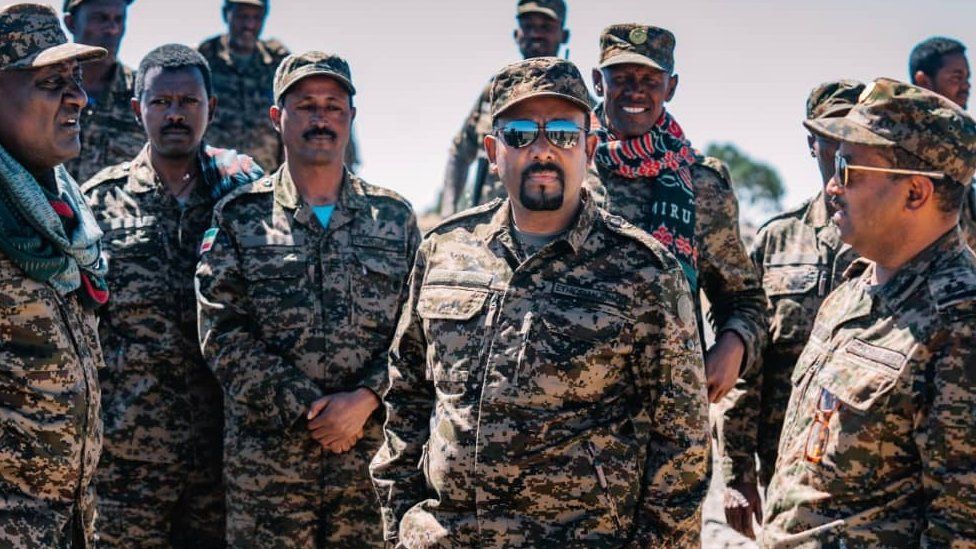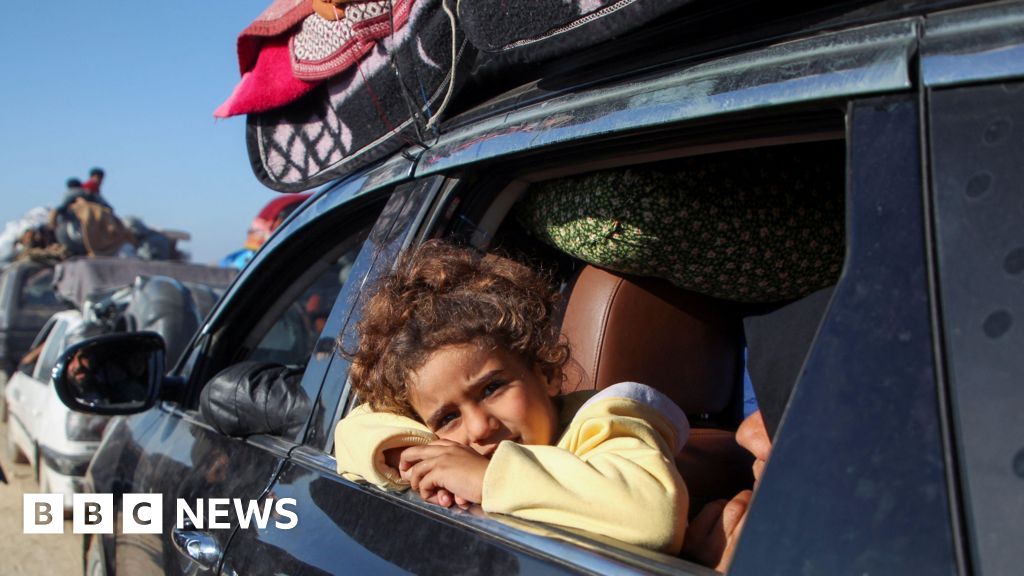ARTICLE AD BOX
 Image source, Fana Broadcasting Corporate
Image source, Fana Broadcasting Corporate
Ethiopia's PM (in sunglasses) won the Nobel Peace Prize a year before the war in Tigray began
By Alex de Waal
Africa analyst
Foreign powers have hailed the truce signed by the Ethiopian government and Tigrayan leaders to end the brutal war in the north of the country and open up the flow of aid to those at risk of famine, but questions remain over whether it will succeed.
A day after the applause died away at the signing ceremony in South Africa's capital, Pretoria, the sound of artillery is still booming over the mountains of Tigray.
The deal conforms broadly with the objectives of Ethiopia's Prime Minister Abiy Ahmed when he launched what he called a "law enforcement operation" against the party ruling the region - the Tigray People's Liberation Front (TPLF) - two years ago, almost to the day.
There will be a process for the negotiated disarmament of the Tigrayan fighters.
Mr Abiy's ascendancy is marked by the fact that the agreement is with the TPLF, not - as the Tigrayans had wanted - the "Government of Tigray".
He is rejecting the 2020 elections in Tigray, won by the TPLF, and planning for a new poll.
However, the federal government had demanded the complete surrender of the TPLF. It did not achieve that.
It has promised to remove the TPLF's designation as a terrorist organisation, and enter political negotiations with it on how Tigray should be run.
The agreement emphasises that both parties will abide by the existing federal constitution.
This includes resolving the status of areas such as the agriculturally rich western Tigray - seized by the neighbouring Amhara region during the early weeks of the war - by constitutional means.
It does not say whether the Tigrayan administration - and the farmers driven out - will return first.
The humanitarian element of the agreement opens the door to ending the starvation and deprivation that have cost the lives of as many as a million people. This includes perhaps 10% of Tigray's population of around six million, according to research published by academics in Belgium.
After two years of blockade and starvation, and under relentless military pressure from the joint forces of the Ethiopian and Eritrean armies plus forces from the Amhara region, the Tigrayan leaders made huge concessions.
Their calculation appears to be that the survival of the people of Tigray was at stake.
Image source, Getty Images
Image caption,The war in northern Ethiopia has caused a massive humanitarian crisis
More than a million have been displaced since fighting resumed in August, unable to harvest their crops.
People are dying of treatable diseases as hospitals run out of basic drugs such as insulin and antibiotics. There was no sign of this ending.
For the millions who have been deprived of food, medicine and other basic services, essential aid cannot come a day too soon.
Crucial questions
There are many unanswered questions. Three are particularly crucial.
According to Western diplomats, the military offensive that broke Tigrayan defence lines was a joint Eritrean-Ethiopian operation directed from Asmara.
Eritrea is not mentioned by name in the agreement. But the text includes a provision for ending "collusion with any external force hostile to either party", which could presumably refer to Eritrea.
Many will be sceptical that the federal government has the means to implement this. Eritrean President Isaias Afewerki is not party to the agreement and has the means to pursue the war regardless of any agreement reached by Mr Abiy.
Second is monitoring and verification.
The agreement is a triumph for Ethiopia's diplomatic strategy of keeping the international community at bay.
The mechanism for monitoring, verification and compliance consists only of a small unit - maximum 10 persons - who report to the African Union (AU) panel chaired by Nigeria's former President Olusegun Obasanjo.
In turn, Mr Obasanjo's mandate is from the AU Commission chairperson Moussa Faki, not the AU Peace and Security Council. The UN is excluded entirely.
Assessing reports of violations and adjudicating disputes will be at the discretion of two men - Mr Obasanjo and Mr Faki - an unusual oversight mechanism to say the least.
It is standard practice for high-level peace agreements to be witnessed by international partners.
In this case, the AU allowed only the UN, the US and the East African regional body Igad as observers, but none of them signed the agreement.
Image source, AFP
Image caption,Patients at hospitals in Tigray have faced a lack of medicine and equipment
The EU was barred from observing, even though it is the AU's largest donor.
Ethiopia and the AU will be counting on international endorsement nonetheless - not least because Ethiopia desperately needs foreign aid.
Third is justice and accountability.
The agreement provides for the Ethiopian government to establish a "comprehensive national transitional justice policy", making no mention of any international investigations, for example by the UN Human Rights Council or the African Commission on Human and People's Rights.
Mr Obasanjo observed that signing an agreement is just the first step, and implementing it is much harder work.
The prospect for peace and an end to the atrocities and starvation in Tigray and the stabilisation of Ethiopia depends largely on the good faith of the federal government.
An early test will be its promise only to make joint public statements with the TPLF and to put an end to "hostile propaganda, rhetoric and hate speech".
'Humiliating terms'
Tigrayans at home and in the diaspora have greeted the deal with dismay.
It is possible that some Tigrayan commanders would rather continue guerrilla war than submit to what they regard as humiliating peace terms.
Many in the international community have assumed that Mr Abiy has good intentions, and that he will return to the path of peace, democracy and stability if given a chance.
Others fear that the lesson that Mr Abiy, Mr Isaias and others will have learned is the opposite - namely that overwhelming force, sustained starvation and an information blackout are effective weapons in pursuit of their objectives.
Ethiopians will be hoping that these same methods are not applied to solve other political challenges, including the continuing insurgency in the Oromia region.
The agreement is founded on faith that Mr Abiy will lead Ethiopia out of its crisis.
The very first test of that optimistic assumption was whether the guns would fall silent on Thursday. That did not happen.
Instead the day saw fierce fighting, including large-scale attacks by the Ethiopian and Eritrean armies on three fronts, sources in the region say. The Tigrayans are resisting and reportedly holding their ground.
The credibility of the AU and the international observers at the talks - the UN, US and Igad - rests on their readiness to call out the violators from all sides.
Alex de Waal is the executive director of the World Peace Foundation at the Fletcher School of Law and Diplomacy at Tufts University in the US.

 2 years ago
25
2 years ago
25








 English (US) ·
English (US) ·